Unit 2 英语句子翻译技巧
- 格式:ppt
- 大小:259.00 KB
- 文档页数:46
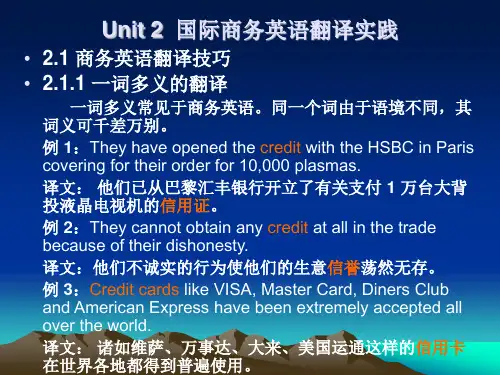
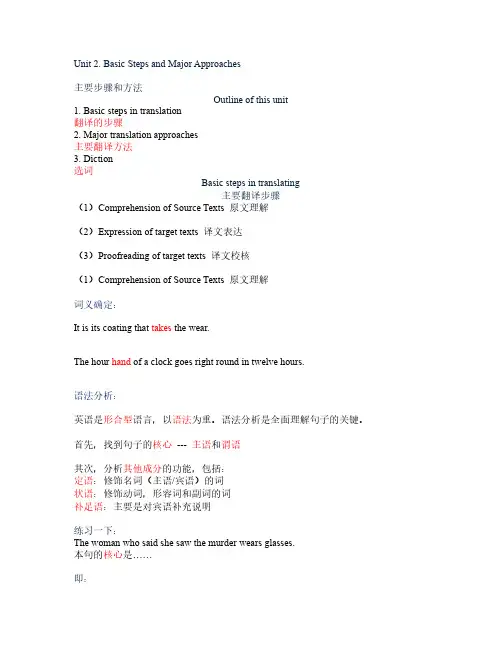
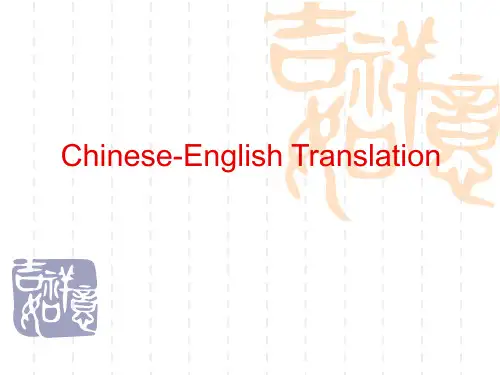
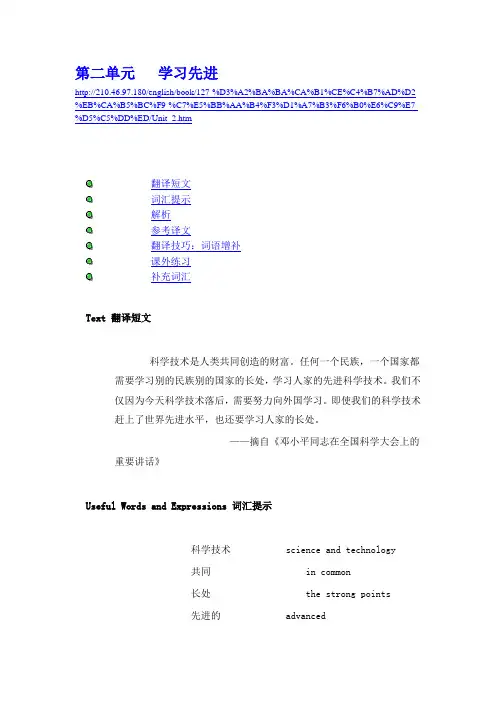
第二单元学习先进http://210.46.97.180/english/book/127-%D3%A2%BA%BA%CA%B1%CE%C4%B7%AD%D2 %EB%CA%B5%BC%F9-%C7%E5%BB%AA%B4%F3%D1%A7%B3%F6%B0%E6%C9%E7-%D5%C5%DD%ED/Unit_2.htm翻译短文词汇提示解析参考译文翻译技巧:词语增补课外练习补充词汇科学技术是人类共同创造的财富。
任何一个民族,一个国家都需要学习别的民族别的国家的长处,学习人家的先进科学技术。
我们不仅因为今天科学技术落后,需要努力向外国学习。
即使我们的科学技术赶上了世界先进水平,也还要学习人家的长处。
——摘自《邓小平同志在全国科学大会上的重要讲话》Useful Words and Expressions 词汇提示科学技术 science and technology共同 in common长处 the strong points先进的 advanced落后 to be backward/lag behind世界先进水平 the world’s advanced levelsNotes 解析这篇短文摘自邓小平同志在全国科学大会上的讲话。
属演讲文体,具有通俗易懂、礼貌、正式的特点。
全文都应当用一般现在时表达,译者应注意到这一点。
短文的第二句“都需要学习”,如果用need to learn from,口气上显得不够分量,最好译为有强调意味的must learn from,并且把泛指的他指代词“人家的”改为特指复数代词their,这样较为符合英语会话习惯。
第三句“我们不仅因为今天科学技术落后,需要努力向外国学习。
”如果只注意语言形式的对等,我们可能这样翻译:It is not just because we are scientifically backward now that we have to learn from other countries.这样译虽然在形式上保留了原文的“因为”,但是,事实上,这句话真正强调的不是原因:“因为什么而学习”,也不是条件:“在什么条件下要学习”,而是时间:“无论什么时候都要学习”。
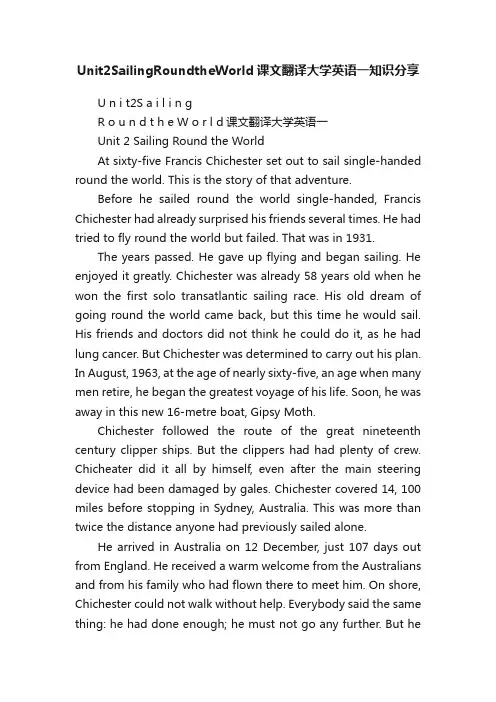
Unit2SailingRoundtheWorld课文翻译大学英语一知识分享U n i t2S a i l i n gR o u n d t h e W o r l d课文翻译大学英语一Unit 2 Sailing Round the WorldAt sixty-five Francis Chichester set out to sail single-handed round the world. This is the story of that adventure.Before he sailed round the world single-handed, Francis Chichester had already surprised his friends several times. He had tried to fly round the world but failed. That was in 1931.The years passed. He gave up flying and began sailing. He enjoyed it greatly. Chichester was already 58 years old when he won the first solo transatlantic sailing race. His old dream of going round the world came back, but this time he would sail. His friends and doctors did not think he could do it, as he had lung cancer. But Chichester was determined to carry out his plan. In August, 1963, at the age of nearly sixty-five, an age when many men retire, he began the greatest voyage of his life. Soon, he was away in this new 16-metre boat, Gipsy Moth.Chichester followed the route of the great nineteenth century clipper ships. But the clippers had had plenty of crew. Chicheater did it all by himself, even after the main steering device had been damaged by gales. Chichester covered 14, 100 miles before stopping in Sydney, Australia. This was more than twice the distance anyone had previously sailed alone.He arrived in Australia on 12 December, just 107 days out from England. He received a warm welcome from the Australians and from his family who had flown there to meet him. On shore, Chichester could not walk without help. Everybody said the same thing: he had done enough; he must not go any further. But hedid not listen.After resting in Sydney for a few weeks, Chichester set off once more in spite of his friends' attempts to dissuade him. The second half of his voyage was by far the more dangerous part, during which he sailed round the treacherous Cape Horn.On 29 January he left Australia. The next night, the blackest he had ever known, the sea became so rough that the boat almost turned over. Food, clothes, and broken glass were all mixed together. Fortunately, bed and went to sleep. When he woke up, the sea had become calm the nearest person he could contact by radio, unless there was a ship nearby, Wild be on an island 885 miles away.After succeeding in sailing round Cape Horn, Chichester sent the following radio message to London:" I feel as if I had wakened from a nightmare. Wild horses could not drag me down to Cape Horn and that sinister Southern Ocean again."Just before 9 o'clock on Sunday evening 28 May, 1967, he arrived back in England, where a quarter of a million people were waiting to welcome him. Queen Elizabeth II knighted him with the very sword that Queen Elizabeth I had sailed round the world for the first time. The whole voyage from England and back had covered 28, 500 miles. It had taken him nine months , of which the sailing time was 226 days. He had done what he wanted to accomplish.Like many other adventurers, Chichester had experienced fear and conquered it. In doing so, he had undoubtedly learnt something about himself. Moreover, in the modern age when human beings depend so much on machines, he had given men throughout the world new pride.弗朗西斯·奇切斯特在六十五岁时开始了只身环球航行。
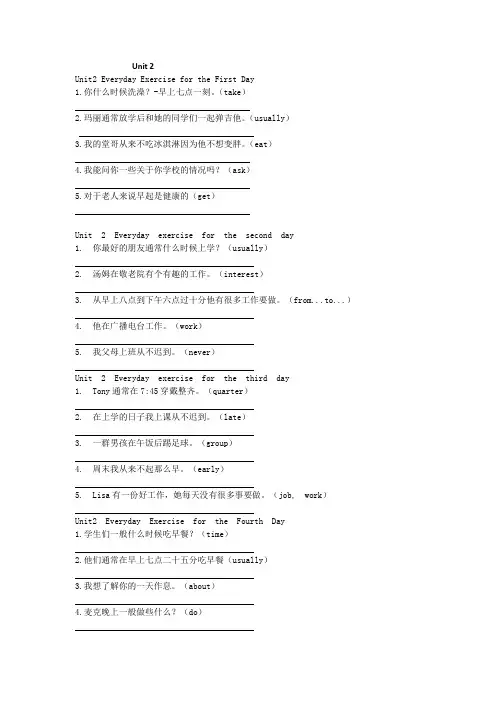
Unit 2Unit2 Everyday Exercise for the First Day1.你什么时候洗澡?-早上七点一刻。
(take)2.玛丽通常放学后和她的同学们一起弹吉他。
(usually)3.我的堂哥从来不吃冰淇淋因为他不想变胖。
(eat)4.我能问你一些关于你学校的情况吗?(ask)5.对于老人来说早起是健康的(get)Unit 2 Everyday exercise for the second day1. 你最好的朋友通常什么时候上学?(usually)2. 汤姆在敬老院有个有趣的工作。
(interest)3. 从早上八点到下午六点过十分他有很多工作要做。
(from...to...)4. 他在广播电台工作。
(work)5. 我父母上班从不迟到。
(never)Unit 2 Everyday exercise for the third day1. Tony通常在7:45穿戴整齐。
(quarter)2. 在上学的日子我上课从不迟到。
(late)3. 一群男孩在午饭后踢足球。
(group)4. 周末我从来不起那么早。
(early)5. Lisa有一份好工作,她每天没有很多事要做。
(job, work)Unit2 Everyday Exercise for the Fourth Day1.学生们一般什么时候吃早餐?(time)2.他们通常在早上七点二十五分吃早餐(usually)3.我想了解你的一天作息。
(about)4.麦克晚上一般做些什么?(do)5.我晚上睡得很早,所以我早上能起很早。
(early)Unit2 Everyday Exercise for the Fifth Day1. 他总是早起早睡。
这是一个好习惯。
(get)2. 他知道吃冰淇淋对他来说是毫无益处的。
(know)3. 我没有时间吃早餐,所以我通常吃地很快。
(quickly)4. 她每天早上洗澡,刷牙,晚饭后散步。
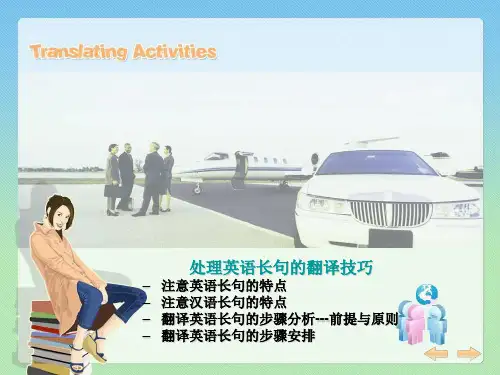
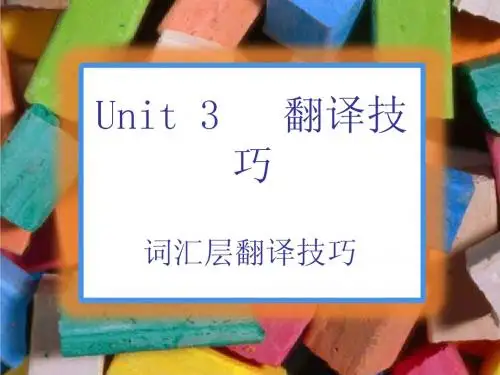
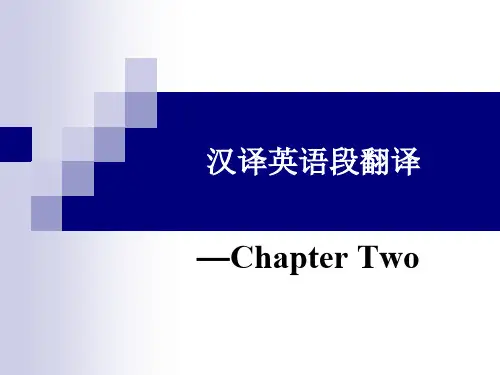
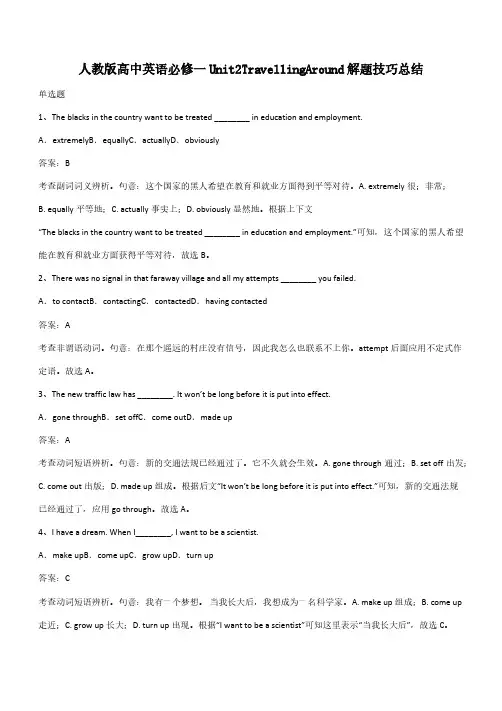
人教版高中英语必修一Unit2TravellingAround解题技巧总结单选题1、The blacks in the country want to be treated ________ in education and employment. A.extremelyB.equallyC.actuallyD.obviously答案:B考查副词词义辨析。
句意:这个国家的黑人希望在教育和就业方面得到平等对待。
A. extremely很;非常;B. equally平等地;C. actually事实上;D. obviously显然地。
根据上下文“The blacks in the country want to be treated ________ in education and employment.”可知,这个国家的黑人希望能在教育和就业方面获得平等对待,故选B。
2、There was no signal in that faraway village and all my attempts ________ you failed.A.to contactB.contactingC.contactedD.having contacted答案:A考查非谓语动词。
句意:在那个遥远的村庄没有信号,因此我怎么也联系不上你。
attempt后面应用不定式作定语。
故选A。
3、The new traffic law has ________. It won’t be long before it is put into effect.A.gone throughB.set offC.come outD.made up答案:A考查动词短语辨析。
句意:新的交通法规已经通过了。
它不久就会生效。
A. gone through通过;B. set off出发;C. come out出版;D. made up组成。
根据后文“It won’t be long before it is put into effect.”可知,新的交通法规已经通过了,应用go through。
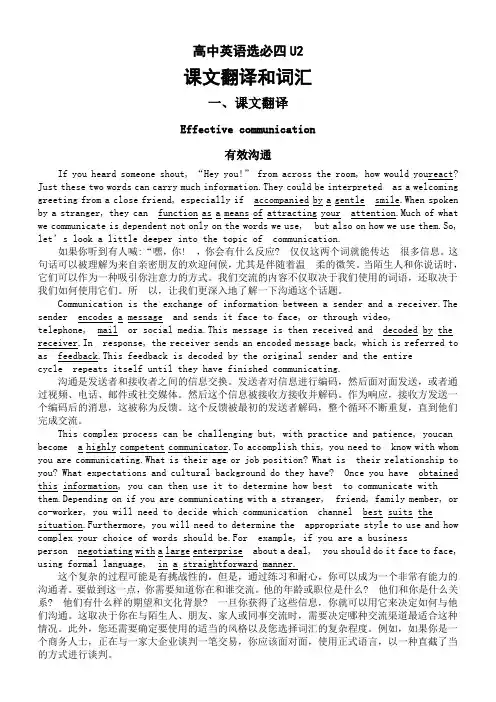
高中英语选必四U2课文翻译和词汇一、课文翻译Effective communication有效沟通If you heard someone shout, “Hey you!” from across the room, how would you react? Just these two words can carry much information.They could be interpreted as a welcoming greeting from a close friend, especially if accompanied by a gentle smile.When spoken by a stranger, they can function as a means of attracting your attention.Much of what we communicate is dependent not only on the words we use, but also on how we use them.So, let’s look a little deep er into the topic of communication.如果你听到有人喊:“嘿,你! ,你会有什么反应? 仅仅这两个词就能传达很多信息。
这句话可以被理解为来自亲密朋友的欢迎问候,尤其是伴随着温柔的微笑。
当陌生人和你说话时,它们可以作为一种吸引你注意力的方式。
我们交流的内容不仅取决于我们使用的词语,还取决于我们如何使用它们。
所以,让我们更深入地了解一下沟通这个话题。
Communication is the exchange of information between a sender and a receiver.The sender encodes a message and sends it face to face, or through video,telephone, mail or social media.This message is then received and decoded by the receiver.In response, the receiver sends an encoded message back, which is referred to as feedback.This feedback is decoded by the original sender and the entirecycle repeats itself until they have finished communicating.沟通是发送者和接收者之间的信息交换。
Unit2 Some stories are more interesting重点单词meat /miːt/ 肉a piece of /ə piːs əv/ 一块happily /ˈhæpɪlɪ/ 高兴地its /ɪts/ 它的wood /wʊd/ 木头cross /krɒs/ 穿过drop /drɒp/ 落下lose /luːz/ 失去课文翻译A Let's Listen and Say听一听,说一说Peter likes reading stories.This is one of his favourite stories.彼得喜欢阅读故事。
这是他最喜欢的故事之One day, a dog went to a meat shop.The manin the shop gave a piece of meat to the dog.The dog took it and walked home happily.一天,有一只狗去肉店。
肉店的男人给了这只狗一块肉。
这只狗叼起肉开心地回家了。
There was a small river near its home.The dog walked on a piece of wood to cross the river.在它家附近有一条小河。
这只狗走上独木桥过河。
It saw another dog in the water.That dog had a piece of meat in its mouth, too."That piece of meat is better than mine,"it thought.“I'm going to get it.”它在水中看见了另一只狗。
那只狗的嘴里也叼着一块肉。
“那块肉比我的这块好,"它想。
“我要得到它。
”The dog opened its mouth. It wanted the other dog's meat.这只狗张开了嘴。
U2翻译句子您周末做什么?我周末总是去看电影。
他周末作什么?他周末通常帮忙做家务。
他们周末做什么?他们有时候阅读。
约翰周末做什么?他常常使用互联网。
您读英语书不?做出简略肯定回答。
您锻炼不?是的,我有时候锻炼。
他看电视不?做出简略否定回答。
他们去购物不?不,他们几乎不去购物。
莎拉购物不?不,她从不购物。
我几乎没有朋友、他几乎不快乐。
她几乎可不能弹钢琴。
您多久锻炼一次?我每天锻炼。
您们多久去购物一次?每天。
他通常多久使用一次英特网?他通常一天用一次英特网、他们通常多久去看一次电影?他们一周去看两次电影。
约翰通常多久帮忙做一次家务?一个月三次。
您最喜爱的节目是什么?动物世界。
您下周有空不?(free)他下周有空不?(have)您能够免费吃桌上的面包。
玻璃杯里装满了水。
我饱了,妈妈。
为什么呢?/如何会?您正在学哪种舞呢?他正在跳舞、我喜爱摇摆舞。
我一周上三次钢琴课。
您也许是对的、也许您是对的、他也许会做作业、也许他会做作业。
约翰也许正在游泳。
也许约翰正在游泳。
至少,我吃了一个冰淇淋。
至少,我依然是一名学生。
至少,我会唱歌。
我一周至少玩一次电脑游戏、他至少15岁。
他至少吃了5个汉堡包、我通常熬夜。
您应该吃一顿健康的晚餐。
我每天游泳。
我正在做我的每日作业。
杰克正在睡觉。
我想要去睡觉。
(sleep)我一年去两次乡村野营。
您在您的空闲时间做了什么?我上个月问了我的老师一个问题、我将会在下个月问我的老师关于她的生日。
我妈叫我不要弹吉他。
我大约每天6点起床、我昨天大约看了2小时电视。
这部电影是关于您的老师的、我能够用您的钢笔不?这个地方是一些照片。
这个地方是一只新的钢笔。
我找到了我的铅笔。
我发现您是一个学生、他发现您正在看电视。
百分之85的学生们正在做作业、教室里有10个学生。
他们中的50%可不能打篮球。
橙汁中50%是水。
我有10支铅笔。
我只喜爱他们中的53%。
我有10支铅笔。
20%是红色的、我根本不是年轻的、他根本没有正在帮忙做家务。
考研英语二翻译题技巧考研英语二翻译题技巧英语和汉语是两种截然不同的语言,语法结构和逻辑思维习惯都不太一样,同学们需要分析句子的语法和逻辑结构。
找到句子主干和修饰语,弄清修饰语与主干是什么修饰关系。
最后,根据单词和逻辑关系,重新组合成汉语译文。
接下来告诉你英语二翻译题技巧。
一.增译法指根据英汉两种语言不同的思维方式、语言习惯和表达方式,在翻译时增添一些词、短句或句子,以便更准确地表达出原文所包含的意义。
这种方式多半用在汉译英里。
汉语无主句较多,而英语句子一般都要有主语,所以在翻译汉语无主句的时候,除了少数可用英语无主句、被动语态或"There be…"结构来翻译以外,一般都要根据语境补出主语,使句子完整。
英汉两种语言在名词、代词、连词、介词和冠词的使用方法上也存在很大差别。
英语中代词使用频率较高,凡说到人的器官和归某人所有的或与某人有关的事物时,必须在前面加上物主代词。
因此,在汉译英时需要增补物主代词,而在英译汉时又需要根据情况适当地删减。
英语词与词、词组与词组以及句子与句子的逻辑关系一般用连词来表示,而汉语则往往通过上下文和语序来表示这种关系。
因此,在汉译英时常常需要增补连词。
英语句子离不开介词和冠词。
另外,在汉译英时还要注意增补一些原文中暗含而没有明言的词语和一些概括性、注释性的词语,以确保译文意思的完整。
总之,通过增译,一是保证译文语法结构的完整,二是保证译文意思的明确。
二.省译法这是与增译法相对应的一种翻译方法,即删去不符合目标语思维习惯、语言习惯和表达方式的词,以避免译文累赘。
增译法的例句反之即可。
三.转换法指翻译过程中为了使译文符合目标语的表述方式、方法和习惯而对原句中的词类、句型和语态等进行转换。
具体的说,就是在词性方面,把名词转换为代词、形容词、动词;把动词转换成名词、形容词、副词、介词;把形容词转换成副词和短语。
在句子成分方面,把主语变成状语、定语、宾语、表语;把谓语变成主语、定语、表语;把定语变成状语、主语;把宾语变成主语。
3.必修四Unit2 A PIONEER FOR ALL PEOPLE造福全人类的先驱者Although he is one of China's most famous scientists, Yuan Longping considers himself a farmer, for he works the land to do his research. 尽管是中国最著名的科学家之一,袁隆平仍然认为自己是个农民,因为他在田里耕作,进行科学研究。
Indeed, his sunburnt face and arms and his slim, strong body millions of Chinese farmers, for whom he has struggled for the past five decades. 的确,他被太阳晒得黝黑的脸庞和和手臂,以及他那瘦削而又结实的身躯,就跟其他千百万中国农民一样,过去50年来,他一直在努力帮助他们。
Dr Yuan Longping grows what is called super hybrid rice. 袁博士种植的是被称为“超级杂交水稻的”的稻种。
In 1974, he became the first agricultural pioneer in the world to grow rice that has a high output. 1974年,他成为世界上第一位种植高产水稻的农业先锋。
-third more of the crop in the same fields. 这种特殊的稻种使得同样的田地多收获三分之一的产量。
this hybrid strain.如今中国每年出产的稻米有60%以上出自这种杂交稻种。
Born in a poor farmer's family in 1930, Dr Yuan graduated from Southwest Agricultural College in 1953. 袁博士1930年出生,1953Since then, finding ways to grow more rice has been his life goal. 从那时起,As a young man, he saw the great need for increasing the rice output. 年轻时,他就看到了稻田增产的巨大需求。
人教新起点三年级英语上册Unit2 My body课文翻译What's the matter? 怎么了?My leg hurts. 我的腿受伤了。
Oh! My head hurts. 哦!我的头受伤了。
What's the matter? 怎么了?My foot hurts. 我的脚受伤了。
Lesson 1A Look, listen and chant.看,听并齐声唱。
head 头hair 头发arm 手臂hand 手leg 腿body 身体foot 脚I have a body. 我有一个身体。
Me too, me too! 我也是,我也是!I have two heads. 我有两个头!Not me, not me! 我没有,我没有!I have black hair. 我有黑头发!Me too, me too! 我也是,我也是!I have four arms. 我有四只手臂。
Not me, not me! 我没有,我没有!I have four hands. 我有四只手。
Not me, not me! 我没有,我没有!I have two legs. 我有两条腿。
Me too, me too! 我也是,我也是!I have two feet. 我有两只脚。
Me too, me too! 我也是,我也是!B Let's talk. 一起说吧。
I have three heads and two legs, but no arms. 我有三个头和两条腿,但没有手臂。
I have a body, two legs and two feet.我有一个身体,两条腿和两个脚。
I have black hair. 我有黑头发。
Lesson 2 A Look, listen and repeat. 看,听并重复。
Joy: Ohch! 哎哟!Bill: What's the matter? 怎么了?Joy: My foot hurts. 我的脚受伤了。